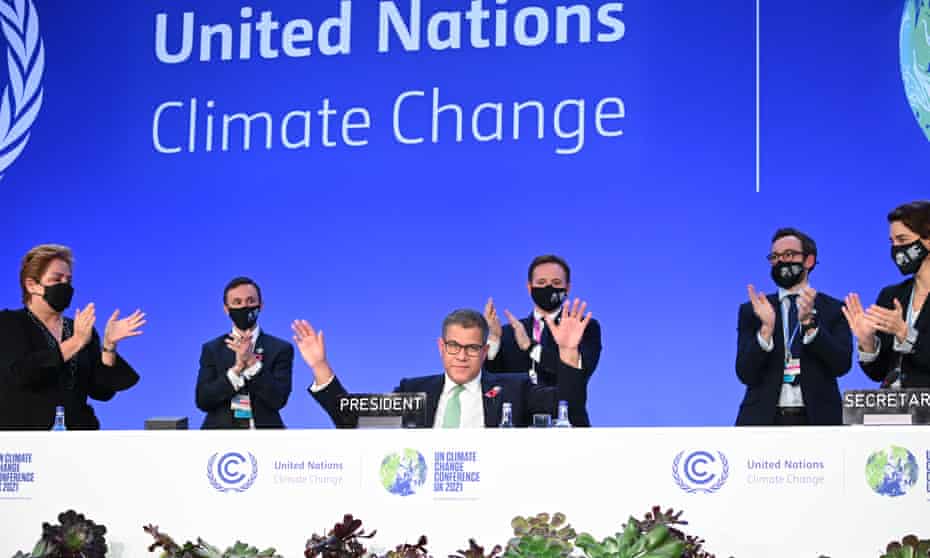Extract from The Guardian
Delegates and campaigners weigh the promise and the shortfalls of the Cop26 conference deal
Boris Johnson, the UK prime minister, said: “We asked nations to come together for our planet at Cop26, and they have answered that call. I want to thank the leaders, negotiators and campaigners who made this pact happen – and the people of Glasgow who welcomed them with open arms.
“There is still a huge amount more to do in the coming years. But today’s agreement is a big step forward and, critically, we have the first ever international agreement to phase down coal and a roadmap to limit global warming to 1.5C [above pre-industrial levels]. I hope that we will look back on Cop26 in Glasgow as the beginning of the end of climate change, and I will continue to work tirelessly towards that goal.”
Al Gore, the former US vice-president, also praised the public pressure put on world leaders at the conference: “The Glasgow Climate Pact and the pledges made at Cop26 move the global community forward in our urgent work to address the climate crisis and limit global temperature rise to 1.5C, but we know this progress, while meaningful, is not enough.
“We must move faster to deliver a just transition away from fossil fuels and toward a cleaner and more equitable future for our planet. The progress achieved in the lead-up to and at Cop26 was only possible because of the power of people – young and old – using their voices to demand action.”
Many developed and developing countries hailed the progress it represented on the world’s goals. But green campaigners warned that the urgency of the climate crisis meant the world was running out of time.
Frans Timmermans, executive vice-president of the European Commission, summed up many countries’ reactions, saying: “It doesn’t stop here, it only starts.”
On the last-minute weakening of language about phasing out coal, Timmermans said: “Let’s be clear, I’d rather not have the change. I was very happy with the language we had.”
But he added it was “like going from 24 carat gold to 18 carat, it’s still gold … we are now making concrete steps to eliminate coal … and that countries that are so dependent on coal are willing to be part of that agreement is astonishing”.
Countries will have to return next year and the year after to update their targets on cutting greenhouse gas emissions. Laurence Tubiana, one of the architects of the 2015 Paris deal and now CEO of the European Climate Foundation, said the outcome showed that the 2015 Paris climate agreement was working as intended.
“Despite the Covid-19 crisis, we have accelerated action, responded to the [scientists’] call to close the gap towards 1.5C, and [an agreement to phase down] coal is in the text,” she said.
But she added: “There is a lot more to do. The commitments and claims of the first week on finance, forests, end of public finance for fossil fuel, methane and cars must now be translated into real policy and oil and gas production still to be addressed.
Many youth activists and those from some of the most vulnerable countries took a bleaker view, however. Vanessa Nakate, a climate activist from Uganda, said: “Even if leaders stuck to the promises they have made here in Glasgow, it would not prevent the destruction of communities like mine. Right now, at 1.2C of global warming, drought and flooding are killing people in Uganda. Only immediate, drastic emissions cuts will give us hope of safety, and world leaders have failed to rise to the moment.”
She said the scale of the climate movement was increasing: “People are joining our movement. 100,000 people from all different backgrounds came to the streets in Glasgow during Cop and the pressure for change is building.”
Rachel Kennerley, climate campaigner at Friends of the Earth, criticised the UK government as host nation of the talks. “The road to 1.5C just got harder when these talks should have cleared the way to making it a whole lot easier. The UK government cunningly curated announcements throughout this fortnight so that it seemed rapid progress was being made. Here we are though, and the Glasgow get-out clause means that leaders failed to phase out fossil fuels and the richest countries won’t pay historic climate debt.”
She added that the government should take more action at home on cutting emissions: “With the Cop moment over, countries should break away from the pack in their race for meaningful climate action and let history judge the laggards. The UK, as a country with huge historical responsibility for emissions, can end support for a mega gas project in Mozambique, pull the plug on the Cambo oilfield, stop the new coalmine in Cumbria and drilling for oil in Surrey. After all, the prime minister talked a big game at the beginning of the fortnight.”

No comments:
Post a Comment